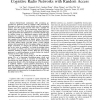Free Online Productivity Tools
i2Speak
i2Symbol
i2OCR
iTex2Img
iWeb2Print
iWeb2Shot
i2Type
iPdf2Split
iPdf2Merge
i2Bopomofo
i2Arabic
i2Style
i2Image
i2PDF
iLatex2Rtf
Sci2ools
INFOCOM
2011
IEEE
2011
IEEE
Pricing-based spectrum access control in cognitive radio networks with random access
Abstract—Market-based mechanisms offer promising approaches for spectrum access in cognitive radio networks. In this paper, we focus on two market models, one with a monopoly primary user (PU) market and the other with a multiple PU market, where each PU sells its temporarily unused spectrum to secondary users (SUs). We propose a pricing-based spectrum trading mechanism that enables SUs to contend for channel usage by random access, in a distributed manner, which naturally mitigates the complexity and time overhead associated with centralized scheduling. For the monopoly PU market model, we first consider SUs contending via slotted Aloha. The revenue maximization problems here are nonconvex. We first characterize the Pareto optimal region, and then obtain a Pareto optimal solution that maximizes the SUs’ throughput subject to the SUs’ budget constraints. To mitigate the spectrum underutilization due to the “price of contention,” we revisit the problem where SUs contend via ...
Related Content
| Added | 30 Aug 2011 |
| Updated | 30 Aug 2011 |
| Type | Journal |
| Year | 2011 |
| Where | INFOCOM |
| Authors | Lei Yang, Hongseok Kim, Junshan Zhang, Mung Chiang, Chee-Wei Tan |
Comments (0)

